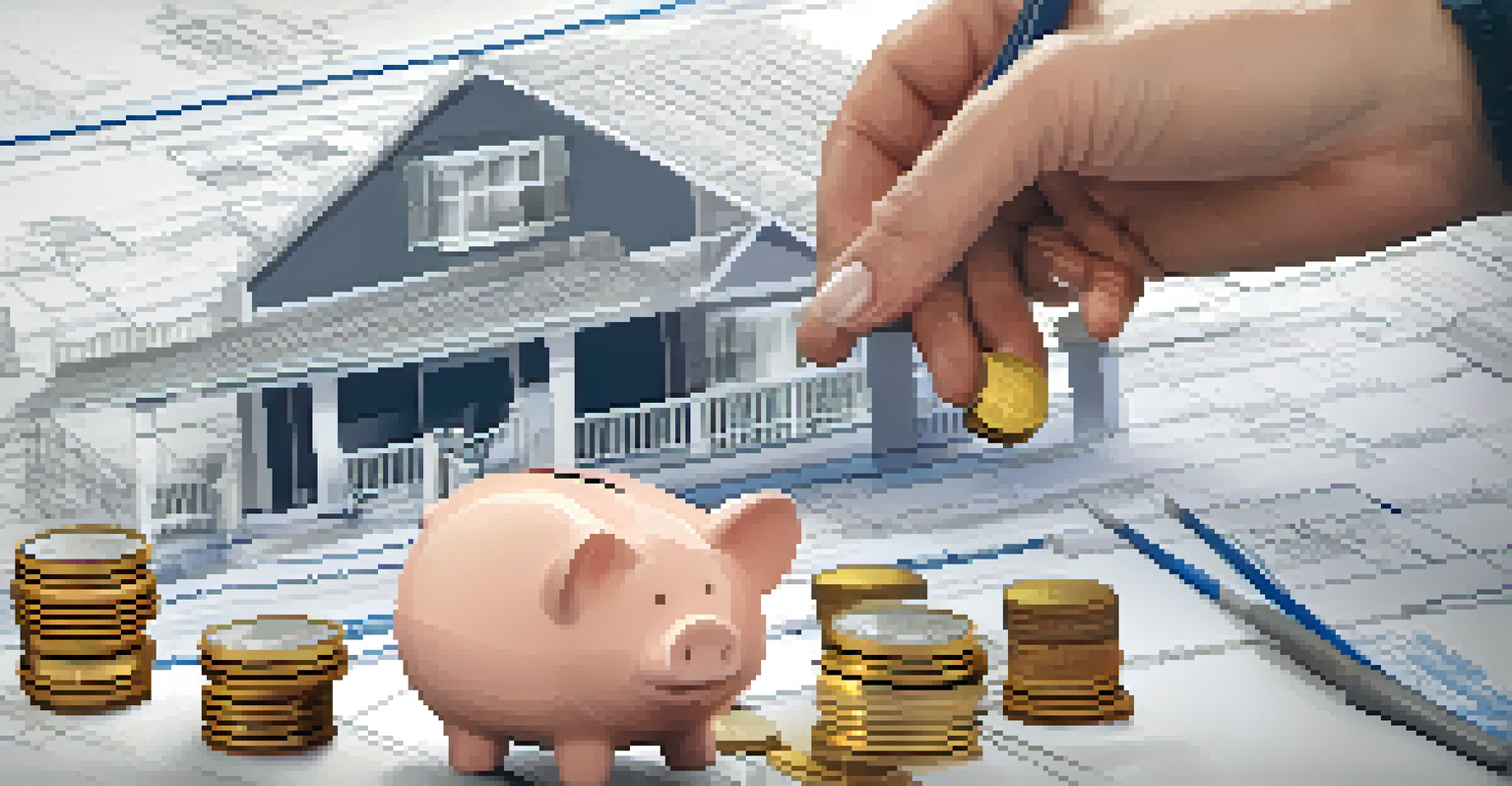Understanding the Role of Personal Savings in Renovations

Why Personal Savings Matter in Renovations
When embarking on a renovation project, personal savings serve as a vital foundation. They provide the financial cushion needed to cover unexpected expenses that often arise during renovations. Think of it as a safety net that helps you avoid the stress of accruing debt or relying solely on loans.
The best way to predict your future is to create it.
Moreover, having a solid savings base can empower you to make informed decisions. Instead of feeling rushed to choose the cheapest option, you can take your time to find quality materials and skilled professionals that fit your vision and budget. This thoughtful approach can lead to a more satisfying outcome.
In essence, personal savings not only alleviate financial pressure but also enhance your renovation experience. They give you the freedom to envision your dream space without the constant worry of how to pay for it.
Setting a Realistic Renovation Budget
Creating a budget is crucial before diving into any renovation project. Start by assessing your savings and determining how much you can comfortably allocate without jeopardizing your financial stability. A clear budget acts as a roadmap, helping you navigate the renovation journey more effectively.

Consider breaking down your budget into categories, such as materials, labor, permits, and contingency funds. This way, you can pinpoint where to invest more and where to cut back, ensuring you stay on track. Remember, it's always wise to expect the unexpected, so allocating around 10-15% for unexpected costs can save you from future headaches.
Personal Savings: A Renovation Safety Net
Having personal savings provides a financial cushion that helps avoid debt and empowers informed decision-making during renovations.
By setting a realistic budget grounded in your personal savings, you'll not only enhance your planning process but also enjoy a smoother renovation experience. This approach allows you to focus on the creative aspects of your project rather than the financial stress.
The Importance of Building an Emergency Fund
An emergency fund is your financial lifeline during renovations. This fund is separate from your renovation budget and is designed to cover unexpected costs, such as plumbing issues or structural problems that may arise. Think of it as your renovation insurance—a way to safeguard your project against unforeseen hurdles.
A budget is telling your money where to go instead of wondering where it went.
Building this fund before starting your renovations can provide peace of mind. It allows you to tackle any surprises without derailing your project or dipping into savings meant for other expenses. Plus, knowing you have a financial buffer can help you feel more confident in your renovation decisions.
Ultimately, having an emergency fund is about preparation and resilience. It ensures that your renovation journey remains enjoyable, allowing you to focus on transforming your space rather than worrying about what might go wrong.
Using Personal Savings to Avoid High-Interest Debt
One of the significant advantages of relying on personal savings is the ability to avoid high-interest debt. Renovations can be costly, and many people may consider financing options like credit cards or loans. However, these can lead to financial strain due to accumulating interest over time.
By utilizing your savings, you can complete your renovation without the looming threat of debt. This approach not only keeps your finances healthier but also grants you the freedom to enjoy your new space without the burden of monthly payments. Imagine the relief of walking into your beautifully renovated home, knowing you fully paid for it.
Establishing a Realistic Budget
Creating a budget based on your savings ensures a smoother renovation experience by allowing you to allocate funds effectively and plan for the unexpected.
In the long run, using personal savings for renovations can lead to a more satisfying financial outcome. You'll have peace of mind and the satisfaction of knowing your hard-earned money was wisely invested.
Finding Ways to Boost Your Personal Savings
If your renovation dreams are bigger than your current savings, don't fret! There are plenty of ways to boost your personal savings. Start by reviewing your monthly expenses—are there areas where you can cut back? Even small changes, like dining out less often or canceling unused subscriptions, can add up over time.
Another effective strategy is to set specific savings goals. For instance, you could aim to save a certain amount each month specifically for your renovation project. Automating your savings—like setting up a direct deposit into a dedicated savings account—can make this process seamless and help you stay on track.
Lastly, consider picking up a side gig or selling items you no longer need. These efforts can provide a quick influx of cash to help you reach your renovation savings goal faster. Remember, every little bit counts when it comes to creating your dream space.
Evaluating Renovation Priorities with Your Savings
Once you've established your personal savings, it’s time to evaluate your renovation priorities. Begin by identifying which areas of your home need the most attention and which projects align with your budget. This prioritization will help you allocate your funds effectively and ensure you focus on what truly matters.
For example, if your kitchen is outdated and affects your daily life, it might take precedence over a cosmetic bathroom update. Having a clear understanding of your priorities allows you to make informed decisions that reflect both your needs and your financial capabilities.
Emotional Benefits of Saving
Saving for renovations not only alleviates financial stress but also fosters a sense of accomplishment and a deeper connection to your transformed home.
This strategic approach not only maximizes the impact of your savings but also ensures you’re investing in your home in a meaningful way. By focusing on high-priority projects, you can create a space that enhances your lifestyle while staying within your financial means.
The Emotional Benefits of Saving for Renovations
Saving for renovations isn't just about finances; it also has emotional benefits. The peace of mind that comes with knowing you have the funds available can alleviate stress and create a more enjoyable renovation experience. You can approach your project with enthusiasm rather than anxiety, knowing you’re financially prepared.
Moreover, achieving your savings goal can instill a sense of accomplishment. The journey of saving, planning, and finally seeing your vision come to life fosters a deeper connection to your home. It’s not just about the physical space; it’s about the memories and experiences you'll create there.

In the end, this emotional investment enhances the overall renovation journey. When you see your home transformed, you’ll not only appreciate the aesthetics but also the effort and dedication that went into making it happen.